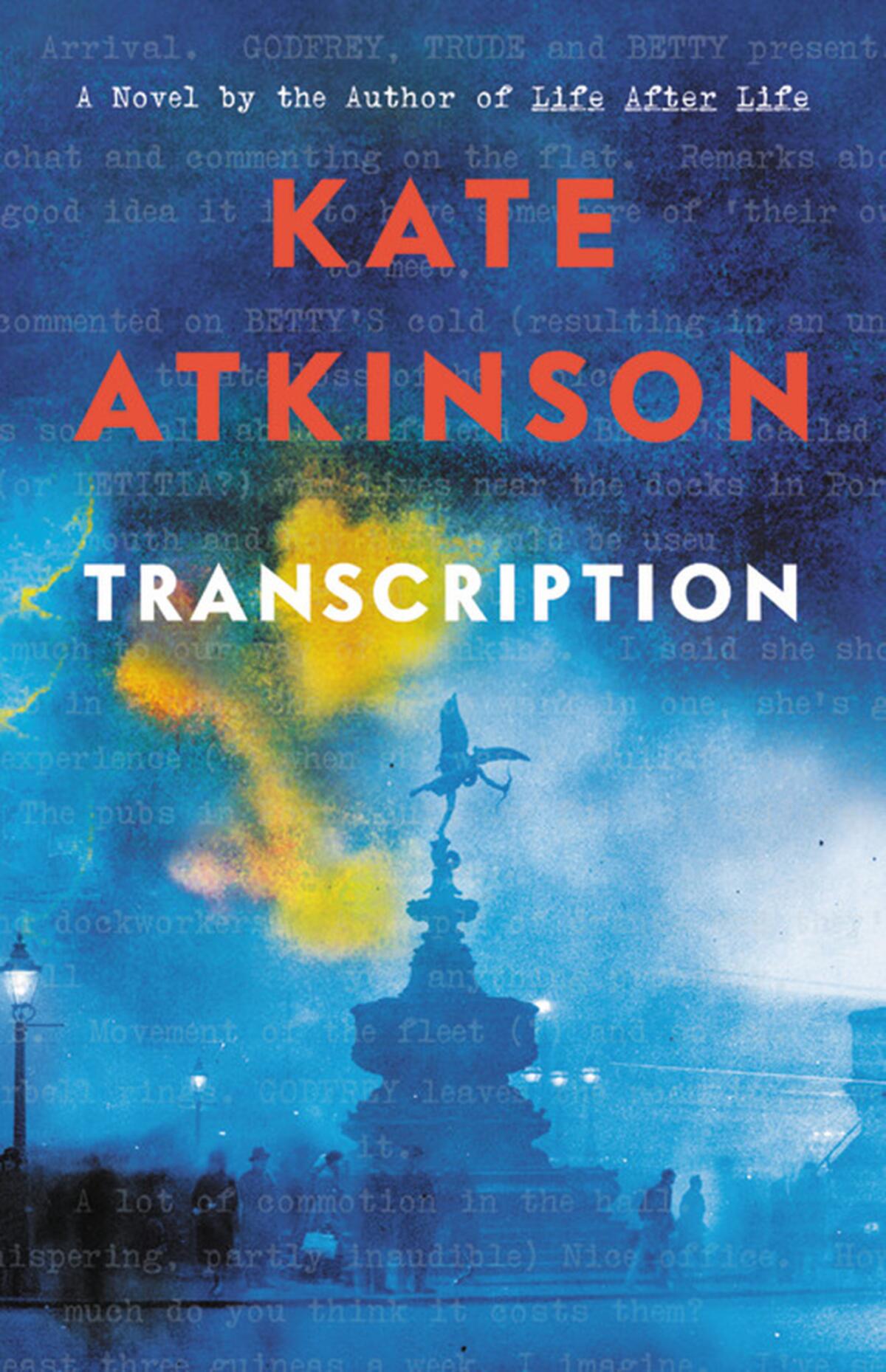Kate Atkinson’s ‘Transcription’ is a WWII spy thriller that’s lost its way
- Share via
“Transcription,” Kate Atkinson’s 10th novel, treads the same ground, wartime Britain, as some of her other work (“Life After Life,” “A God in Ruins”) and flings some of the same themes up in the air like so much crepe hanging gaily over a dance hall that has seen better days.
In this new book, we meet Juliet Armstrong — talented, witty, directionless — who, while working as a secretary in the early days of the war, becomes a part (initially a small part) of an MI5 operation meant to discover and control German sympathizers and spies in England.
Was she plucked, picked, groomed or selected? Atkinson makes us think about which word to use in the gendered and tradecraft-inflected world she creates.
Armstrong’s job is to listen to and transcribe conversations in the next room over in a nondescript apartment building between British citizens who think they are spying for Germany and Godfrey Toby, the British agent posing as a German one. Gradually (or is it suddenly?), Armstrong is asked to perform other work: She is tapped by her boss, Peregrine Gibbons, to become a spy in her own right.
She creates a persona — pro-Germany, pro-Nazi — and ingratiates herself in fascist circles. But Armstrong is not really fully formed in and of herself. She has problems with her own natural “persona,” if not her person. She doesn’t know, really, who she is or what she wants. And so becoming a totally different person is not without complications, and the adventure in spying contains unexpected dangers.
Atkinson does what she does well in this latest novel: She gives us the amateurish bumblings of people thrust into situations larger than themselves. She creates a wonderfully atmospheric wartime London — not with the usual fogs and mists coming off the Thames but with the shrouds (plural, and all of them tattered and incomplete but frustrating) and mists of lies. No one knows who they are or what they are about, and they don’t know who anyone else is really and what they are about either. Atkinson does this beautifully and to full effect.

She also does that other thing she does: gives us one storyline and intercuts it with others as she did in her forceful debut, “Behind the Scenes at the Museum.” In this case, however, Atkinson does not look at the central line or its themes by way of different points of view and instead hews close to Armstrong and what she can see and know. Half the point of the book is motivated by the question of how to proceed, how to move ahead in life when you don’t and can’t know what’s most important in order to proceed at all.
But I couldn’t help but feel that, like Armstrong herself, the book had problems with its persona. It didn’t know what it was or where it was going. Things are picked up and dropped, never to be picked up again. Things happen without any direct consequence. In the opening pages, Juliet is hit by a car — but we never revisit it. (Why was she hit? Was it spy stuff? Is she going to be OK?) I still wonder if this is a kind of clever mimesis. But the wonder didn’t lead anywhere except, at first, confusion and then, later, to exhaustion. Not unpleasant exhaustion.
And the prose — although apt and of the time the novel takes place — felt provisional somehow: a hurriedly built set rather than a crafted piece. Atkinson has never, in all I’ve read of hers, put language before story (and I’m grateful she doesn’t do that here either). But this novel felt like Atkinson didn’t intend for this to be a book as much as a stopping off point on the way to a great BBC series. Much of the prose is animated by Armstrong’s interior monologues and asides. In the depths of her unknowing, Armstrong has only words and associations to play with rather than facts and knowledge. “Life had progressed at such a pace in the previous week that the flamingo’s arrival on her doorstep seemed like something from a dream now. A small man without a hat, a pawn. They were all pawns, of course, in someone else’s great game. She had thought herself to be a queen, not a pawn. How foolish to think such a thing was possible, when the Mertons and Fishers of this murky world were in charge of the board.”
But in the end, very few writers could create the kind of lusty confusion experienced by her characters and still give the story a forward slant, a hard drive, a plot. And it was refreshing to read a book that denies its characters a postwar victory lap, as though the end of hostilities was the return of sense. Our current world situation is proof of that myth.
David Treuer is the author of six books. His next, “The Heartbeat of Wounded Knee,” will be published by Riverhead in January 2019.
----
See Kate Atkinson at LiveTalks LA
Where: Ann and Jerry Moss Theatre, New Roads School, Herb Alpert Educational Village, 3131 Olympic Blvd., Santa Monica
When: 8 p.m. Oct. 2
::
“Transcription”
Kate Atkinson
Little, Brown: 352 pp., $28
Sign up for our Book Club newsletter
Get the latest news, events and more from the Los Angeles Times Book Club, and help us get L.A. reading and talking.
You may occasionally receive promotional content from the Los Angeles Times.





